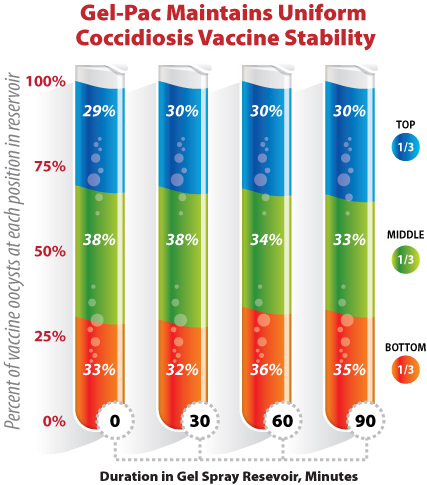
Gel-Pac® delivering optimal suspension...
Gel-Pac, from its initial adoption in the poultry industry, has been most commonly used to deliver orally active probiotic bacteria to young birds in commercial hatcheries. Easy to prepare, adaptable to existing equipment, and voraciously eaten by hatchlings, the gel spray is popularly applied to birds as early as day-of-hatch to get the most rapid gut colonization possible on this side of the egg.
Birds are attracted to Gel-Pac and industry vets have been too. Seeing and capitalizing on the bird’s natural tendency to consume the bright green gel droplets, consultants based at the specialist Poultry Veterinary Practice, Slate Hall Veterinary Practice near Cambridge, England, wanted to test other challenging applications. One such application is to ensure uniform coccidiosis vaccine protection.
Live coccidiosis vaccines provide immunity by entering the digestive tract. Historically they have been given in individual eye drop, mass feed spray, drinking water, liquid spray, or more recently in gel pucks, and in ovo injections. The prevailing trend is toward earlier dosing, so convenient liquid hatchery spray is widely used.
Properly delivering a cocci vaccine via spray to an entire flock requires even, uniform distribution of the live protozoal oocysts in the liquid solution. Oocysts are heavy and vaccines have been criticized for falling out of solution. Vaccine companies, fearing the negative impact of non-uniform vaccinations, want to ensure customers get the vaccine evenly sprayed on every bird exiting the hatchery. Overdosing some live cocci vaccines from the bottom of a solution can cause lesions that result from too many of the parasitic oocysts invading the intestinal cells of individual birds. Underdosing will fail to generate adequate immunity and future protection. Consequently, vaccine labels and inserts plainly and repeatedly warn users to:

 Gel-Pac not only preserves the biological stability, meaning lifespan of live bacteria or virus vaccines in tap water or well water, it also protects positional stability meaning distribution in the spray reservoir. The probiotics that many poultry hatcheries spray with Gel-Pac are significantly smaller organisms than coccidial oocysts, about 150 times smaller. The difference between tiny 0.2 micron live bacteria or virus vaccines and the large 15-30 micron oocysts in cocci vaccines is like the difference between sesame seeds and bowling balls.
Gel-Pac not only preserves the biological stability, meaning lifespan of live bacteria or virus vaccines in tap water or well water, it also protects positional stability meaning distribution in the spray reservoir. The probiotics that many poultry hatcheries spray with Gel-Pac are significantly smaller organisms than coccidial oocysts, about 150 times smaller. The difference between tiny 0.2 micron live bacteria or virus vaccines and the large 15-30 micron oocysts in cocci vaccines is like the difference between sesame seeds and bowling balls.
To be certain Gel-Pac can guard the vaccine and the birds against the risk of non-uniform spray solutions, the Slate Hall group tested the positional stability of the popular Paracox 8® coccidiosis vaccine, an eight-strain product of MSD Animal Health. The typical concentration of 4,000 vaccine doses per liter was dispersed in a finished gel spray. The gel was produced in the same proportion as hatcheries use, by mixing the Gel-Pac powder concentrate with water at the rate of 25 grams per liter. These solutions were mixed vigorously at the start of the experiment and then left undisturbed for the 90 min testing period except for the removal of the samples. At each time interval 3ml samples from the top, middle and bottom of the solutions were taken and diluted for counting in a counting chamber. Percentage values were calculated for each time interval to give a clearer indication of relative oocyst concentrations through the test solution.
The oocyst counts revealed a firm pattern of positional stability in the Gel-Pac solution. The figure illustrates the evenly dispersed relative oocyst concentrations reported at each level of the researcher’s gel suspension.
There is a strong trend in poultry production to dose oral vaccines and health products as early as possible to manage the birds’ rapidly developing immune and digestive systems. Pushing some oral treatments to day of hatch presents challenges, among those are cocci vaccines. Gel-Pac is the world’s only stabilized gel delivery system engineered to preserve and nurture fragile bacteria and viral vaccines, while also aiding in bird hydration. As the researchers at Slate Hall have also proven, Gel-Pac can be an ideal solution to protect the positional stability of a spray vaccine, allaying risks to its uniform distribution in the delivery system.
Additional information and related articles on Gel-Pac®
SpecSheet | Spec Sheet Spanish | SDS | SDS Chinese | SDS Spanish Gel-Pac® new generation stabilizer aids in the administration of gel-delivered vaccines and probiotics for poultry. It is especially designed to prolong the viability and improve the effectiveness of reconstituted and diluted vaccines and probiotics in a gel that is convenient to prepare and easy for birds to consume.
RELATED ARTICLES:
Coccidia and IBV via Gel-Pac PDF
Gel-Pac Edible Gel for Vaccines PDF
Gel-Pac- The Ideal Gel Delivery System (booklet) ENGLISH | SPANISH
Gel-Pac New Generation Gel Delivery System with Stabilizer SELL SHEET
Gel-Pac® Permits Combining AviPro® Megan® Egg Salmonella Vaccine and Coccidiosis Vaccine for Hatchery Spray Application PDF | ARTICLE
Gel delivered vaccines, probiotics, and nutritional ingredients for poultry PDF | ARTICLE
Effects of Concentration and Temperature on the Viscosity of Gel-Pac PDF | ARTICLE
Gel-Pac Streamlines Newcastle Vaccine and Oral Additive Delivery PDF | ARTICLE
Gel-Pac Improving the titer of live infectious bronchitis vaccine for hatcheries PDF | SPANISH PDF | ARTICLE
Gel-Pac Efficacy of Gel-Pac Application for Poultry Coccidiosis Vaccination PDF | ARTICLE
Gel-Pac Enables Hatchery Vaccination with IB and Coccidiosis in Combination PDF | CHINESE PDF | ARTICLE
Gel-Pac Delivering Optimal Suspension PDF | SPANISH PDF| ARTICLE
